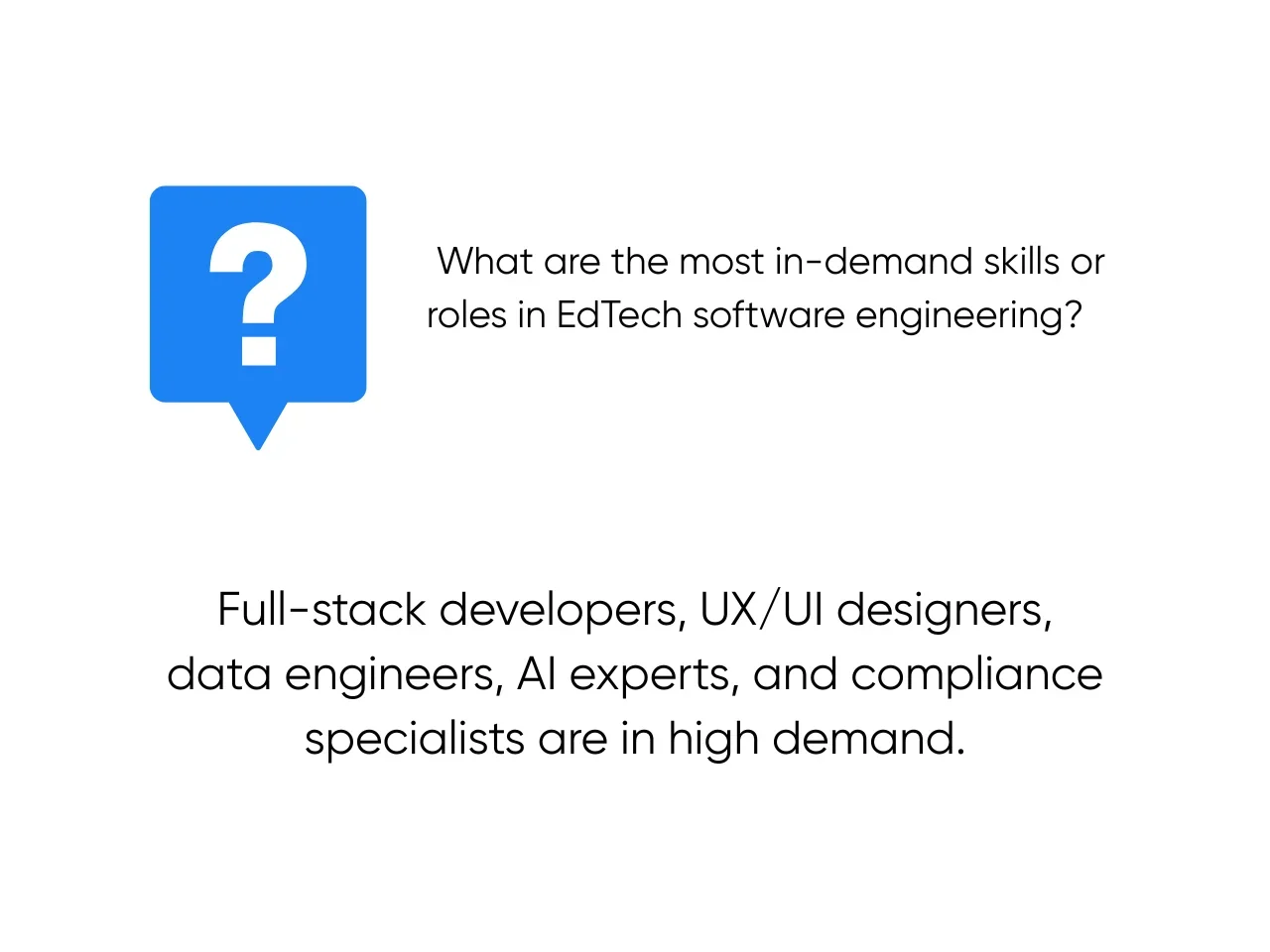In the ever-changing world of EdTech software development, professionals play a crucial role. As the education industry embraces technology to enhance learning experience, startups, and businesses face the challenge of finding skilled developers who can bring their innovative educational software ideas to reality. These challenges encompass various aspects, including designing user-friendly interfaces and ensuring top-notch software engineering while keeping pace with the continuously evolving landscape of educational technology.
Aloa, an expert in software outsourcing, emerges as support for businesses navigating the challenges in this realm. Mainly, startups seeking high-quality development solutions can find a steadfast partner in Aloa. Aloa drives startups' progress as they strive to realize their business goals. Aloa empowers these startups to achieve success. With a deep understanding of programming languages and a grasp of the education industry, these skilled developers create innovative EdTech solutions that revolutionize the learning experience.
In this blog, we will explore how Aloa's expertise and talent pool can guide startups toward success in the field of EdTech, from addressing challenges and how they are resolved to crafting ad templates effectively to diving into the key considerations. This blog offers a glimpse into the transformation that awaits businesses as they leverage their skills.
Let's dive in!
What are EdTech Software Development Professionals?
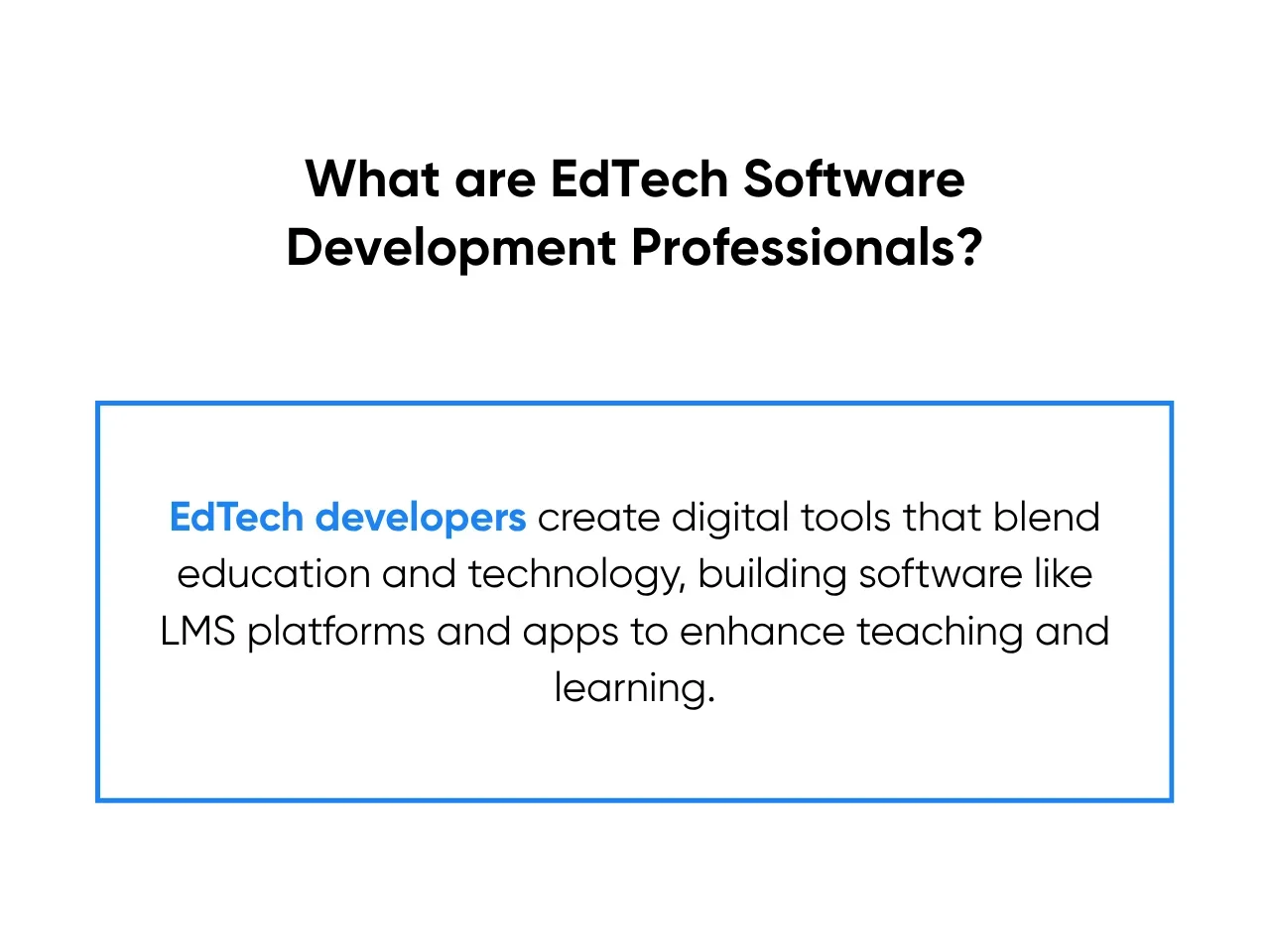
EdTech software development professionals innovate by skillfully crafting digital solutions that seamlessly connect education and technology. Their expertise lies in designing, building, and optimizing software to empower both educators and learners. From intuitive learning management systems (LMS) to captivating mobile apps, their creations enhance the teaching and learning journey.
They utilize create user-friendly interfaces and develop interactive features with coding proficiency. EdTech software development encompasses collaborating with educators, UX designers, and business analysts to ensure seamless functionality and optimal user experience (UX). Their skills in JavaScript, UI design, and big data management enable the creation of adaptive learning tools and personalized content delivery.
Challenges Addressed by EdTech Software Development Professionals
EdTech software development plays a crucial role in addressing the diverse challenges faced by educational institutions in today's rapidly evolving education landscape. By leveraging innovative solutions, these developers actively tackle pressing issues and ultimately revolutionize the accessibility of education. Here are some fundamental problems that EdTech software development addresses:
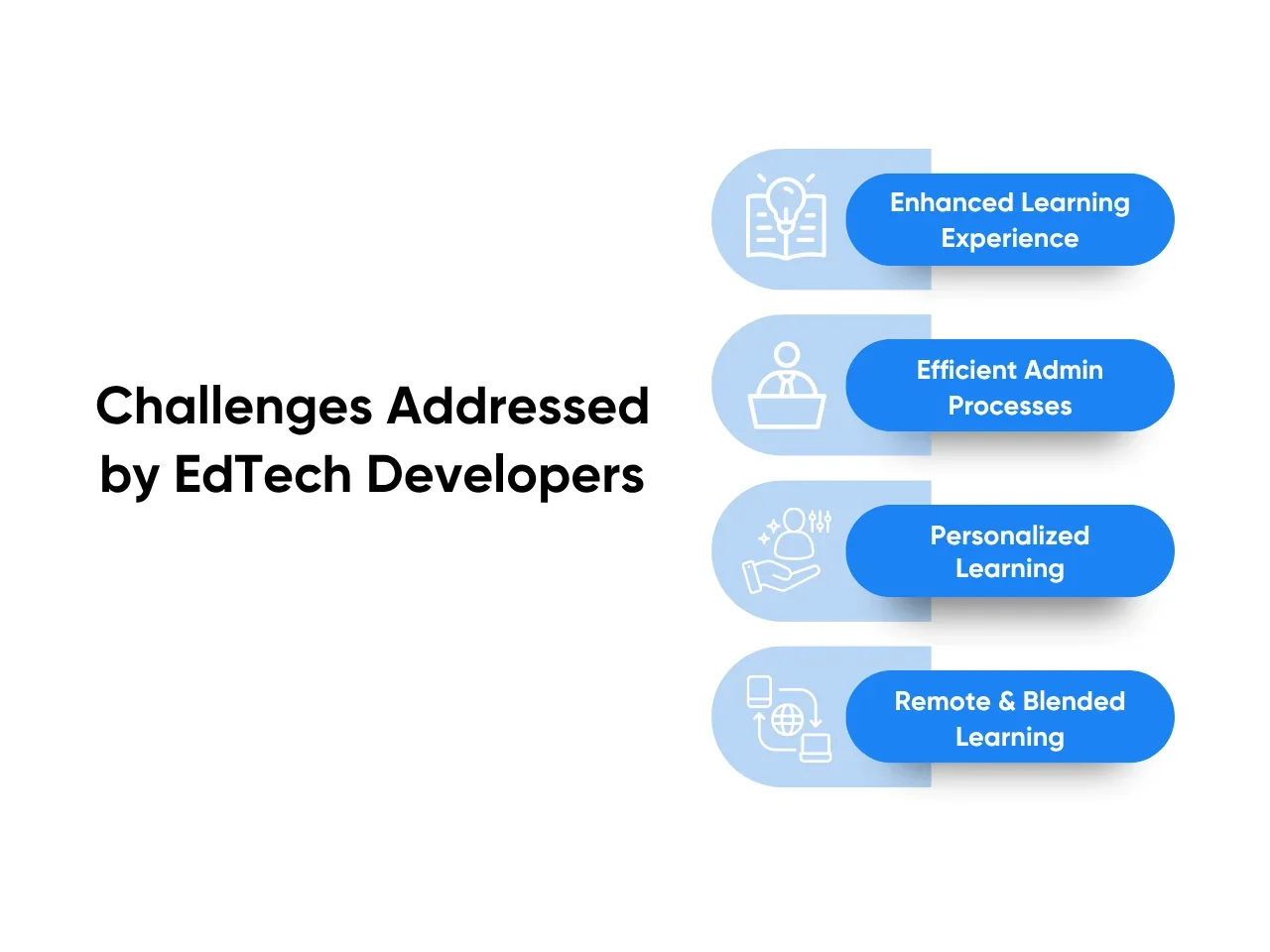
Enhanced Learning Experience
EdTech software development revolutionizes the learning experience. It achieves this by introducing interactive tools, online courses, and digital resources. This approach immerses students in a more engaging way and caters to diverse learning styles. EdTech professionals have created interactive simulations, virtual labs, and gamified learning platforms. These resources immerse students in dynamic educational environments, fostering a deeper understanding and better retention of concepts. By embracing technology, educational institutions can bridge the gap between traditional classroom settings and the digital educational environment.
Efficient Administrative Processes
Administrative processes within educational institutions can present a daunting challenge as they encompass various tasks such as enrollment, attendance tracking, and grading. However, the implementation of EdTech solutions has significantly transformed these operations. By streamlining administrative tasks, EdTech reduces burdens and allows educators to prioritize teaching. Automating routine responsibilities not only minimizes errors but also enhances overall efficiency, enabling institutions to allocate their resources more strategically. Through customized software development tailored to the unique needs of each institution, EdTech ensures smoother workflows and optimizes resource utilization.
Personalized Learning
Personalized learning paths are replacing the concept of a one-size-fits-all education, and EdTech software development is at the forefront of this shift. EdTech developers utilize data-driven insights and AI algorithms to create adaptable platforms tailored to individual students' progress, strengths, and weaknesses. This personalized approach ensures that each student receives an education aligned with their unique learning pace and preferences. As a result, personalized learning enhances engagement, leading to improved learning outcomes and heightened student satisfaction.
Remote and Blended Learning
The rise of remote and blended learning models, particularly following recent global events, has brought attention to the significance of educational technology tools. The development of EdTech software facilitates a seamless shift to online platforms, ensuring uninterrupted education despite physical constraints. Virtual classrooms, video conferencing, and collaboration tools developed by EdTech professionals facilitate effective remote learning. Furthermore, integrating mobile applications and web-based platforms enhances accessibility, making education available beyond traditional boundaries.
Steps on How to Hire EdTech Software Development Professionals
In the rapidly evolving landscape of education technology, hiring skilled EdTech software development professionals is crucial for creating innovative and effective learning platforms. The following seven steps outline a comprehensive approach to identifying, vetting, and securing the right talent for your EdTech projects.
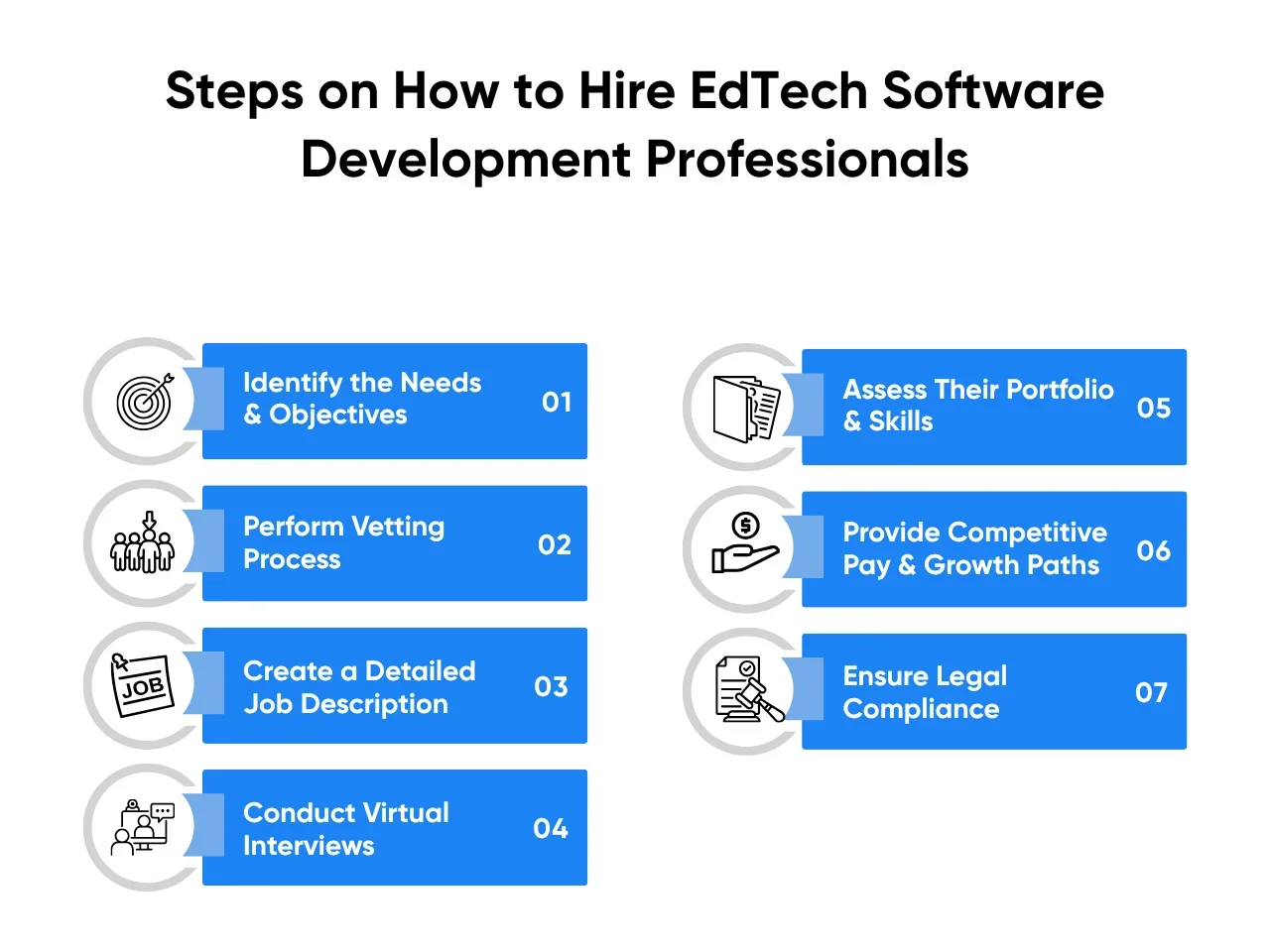
Step 1: Identify the Needs and Objectives
Before beginning the hiring process, it's essential to pinpoint the organization's exact needs. Identifying whether you require web application developers or UI designers will guide your search. Including personalization features is pivotal in the world of online learning. These specifications must align with the broader objectives of your company and its position in the EdTech space.
Here are the key to consider
- Project Scope: Define the scale and nature of your EdTech project. Are you building a seamless web application or enhancing an existing platform's UI? Understanding this shapes the needed skills.
- Personalization: Online learning thrives on personalization. Assess if your project demands personalized features for varied learning styles. Seek candidates skilled in adaptive learning technologies for added value.
Step 2: Perform Vetting Process
Finding the right talent in the bustling online world requires diligence. Platforms like Aloa, Google, and LinkedIn can provide assistance, however, it is Aloa's meticulous vetting process that truly distinguishes itself. This comprehensive procedure involves thorough screening and evaluation of candidates' technical proficiency, experience in EdTech software development, problem-solving abilities, and alignment with the organizational culture. Aloa's comprehensive vetting ensures that only the most fitting candidates are shortlisted.
For startups vetting into the edtech realm, the choice between In-house development and outsourcing holds significance. In-house development offers direct control, fostering customization and quicker iterations. On the other hand, outsourcing brings external expertise and cost efficiencies.
Step 3: Prepare a Comprehensive Job Description
A well-crafted job description is crucial in attracting candidates who meet your requirements. It should clearly outline the responsibilities, skills, and experience needed, with a particular emphasis on web application development, UI design, and comprehension of online learning. By providing a comprehensive roadmap for potential candidates, this carefully articulated job description helps them assess their fit for roles within EdTech software development.
Step 4: Conduct Virtual Interviews
Virtual interviews offer an efficient way to connect with a diverse talent pool worldwide for EdTech software development. These interviews serve the purpose of evaluating candidates' understanding of online learning environments, their self-education mindset, and their potential contributions to organizational success. This step is crucial as it enables the assessment of both practical skills and cultural fit.
Here are some interview questions tailored to this step:
- How do you envision the role of technology in transforming the landscape of online learning?
- Could you share an experience where you contributed to developing an online learning platform? What challenges did you face, and how did you overcome them?
- In the context of EdTech, how do you see the balance between standardized learning experiences and personalized learning paths?
- Tell us about when you had to adapt your coding and design choices to ensure accessibility and inclusivity within an online learning application.
- What strategies do you employ to stay updated with the latest trends and advancements in both technology and education?
- How do you approach user feedback when refining an EdTech application? Can you provide an example of how you incorporated user feedback into a software update?
- How can a robust user interface (UI) positively impact the learning experience in an online environment?
Step 5: Assess Their Portfolio and Skills
A candidate's portfolio is a tangible representation of their expertise in EdTech software development. Carefully examine projects showcasing their web application creation, UI design, and personalization abilities. Their previous work should reflect an understanding of the dynamic online learning sphere, mirroring the needs and wants of modern learners.
Step 6: Offer a Competitive Package and Growth Opportunities
In the competitive field of EdTech software development, offering an attractive package goes beyond salary. It should encompass growth opportunities within the organization, continuous learning, and an environment encouraging innovation and self-education. These aspects contribute to attracting and retaining the top professionals in the field.
Step 7: Ensure Compliance with Legal Regulations
Hiring experts in EdTech software development also involves compliance with various legal regulations. Considerations should include real estate arrangements like office space or remote working conditions and ensuring all contracts and agreements are legally sound. Compliance ensures that the interests of both parties are safeguarded, avoiding potential legal implications down the line. Here are key thing you must consider:
- Contracts: Comprehensive contracts outline work scope, deliverables, timelines, intellectual property ownership, confidentiality, payment terms, and dispute resolution. They establish a binding framework, shielding both parties.
- Intellectual Property: Clear contract terms determine software, code, and related materials ownership. This averts future disputes over rights.
- Data Privacy: Adhering to data protection laws (like GDPR) safeguards user data in online learning platforms, avoiding legal consequences.
- Employment Laws: Adhering to employment laws, including benefits, hours, and leave, ensures ethical treatment of employees, fostering fairness.
Effective Ad for EdTech Software Development Professionals
In the dynamic landscape of education technology, creating an impactful ad template for hiring EdTech software development professionals is paramount. Such a template not only attracts top talent but also clearly conveys the role's essence.
- Job Description: The job description establishes the overall tone for the position. It defines the role as crucial, focusing on the development of innovative educational software solutions. It emphasizes the opportunity to drive innovation in a constantly evolving industry, highlighting the importance of technology in modern education.
- Responsibilities: Outline key responsibilities concisely. Specify designing, coding, testing, and debugging software applications tailored for educational needs. Emphasize the role in enhancing user experience, integrating interactive elements, and ensuring seamless functionality.
- Qualifications: List essential qualifications. Mention a degree in Computer Science or related fields and proficiency in relevant programming languages. Prior experience in EdTech or a similar domain is a plus. Highlighting problem-solving skills, creativity, and a passionate commitment to education technology holds immense significance.
- How To Apply: Provide a straightforward application process. Include a link to your application portal. Encourage applicants to showcase their previous EdTech projects and demonstrate their software development prowess.
Sample Ad Template
Job Description
Join our dynamic team as a Software Developer in the rapidly growing field of EdTech! We seek passionate and innovative individuals to contribute their expertise to our edtech software development projects. As a pivotal player in our organization, the role of a Software Developer entails shaping the landscape of education technology.
Responsibilities
- Collaboration with cross-functional teams is essential for designing, developing, and deploying state-of-the-art educational technology solutions.
- Write clean, efficient, and maintainable code for web and mobile applications tailored to the education sector.
- Participate in architectural discussions to ensure our software products' scalability, security, and optimal performance.
- You should keep updated on the latest trends and technologies in edtech and software development to ensure consistent progress. This knowledge is vital for driving continuous improvement.
Qualifications
- Bachelor's or Master's degree in Computer Science, Software Engineering, or a related field.
- Proven experience (X+ years) in edtech software development, showcasing a strong portfolio of successfully delivered projects.
- Proficiency in (programming languages and technologies related to edtech).
- Solid understanding of (mention specific areas like user experience design, database management, etc.).
- Problem-solving skills and an ability to think creatively to overcome challenges unique to edtech development.
- Strong communication skills to work effectively in a collaborative environment and convey technical concepts to non-technical stakeholders.
How To Apply
Ready to shape the future of education through innovative software solutions? Send your resume, portfolio, and a cover letter detailing your relevant edtech software development experience to [email address]. In your cover letter, please highlight your contributions to (mention specific project/s or achievement/s related to edtech). Join us in revolutionizing the way education and technology intersect!
Considerations When Hiring EdTech Software Development Professionals
The development of EdTech software has become a crucial tool in modernizing learning methods within the ever-changing landscape. When hiring professionals for EdTech software development, several essential factors must be considered. These considerations ensure the creation of effective and innovative solutions that enhance education.
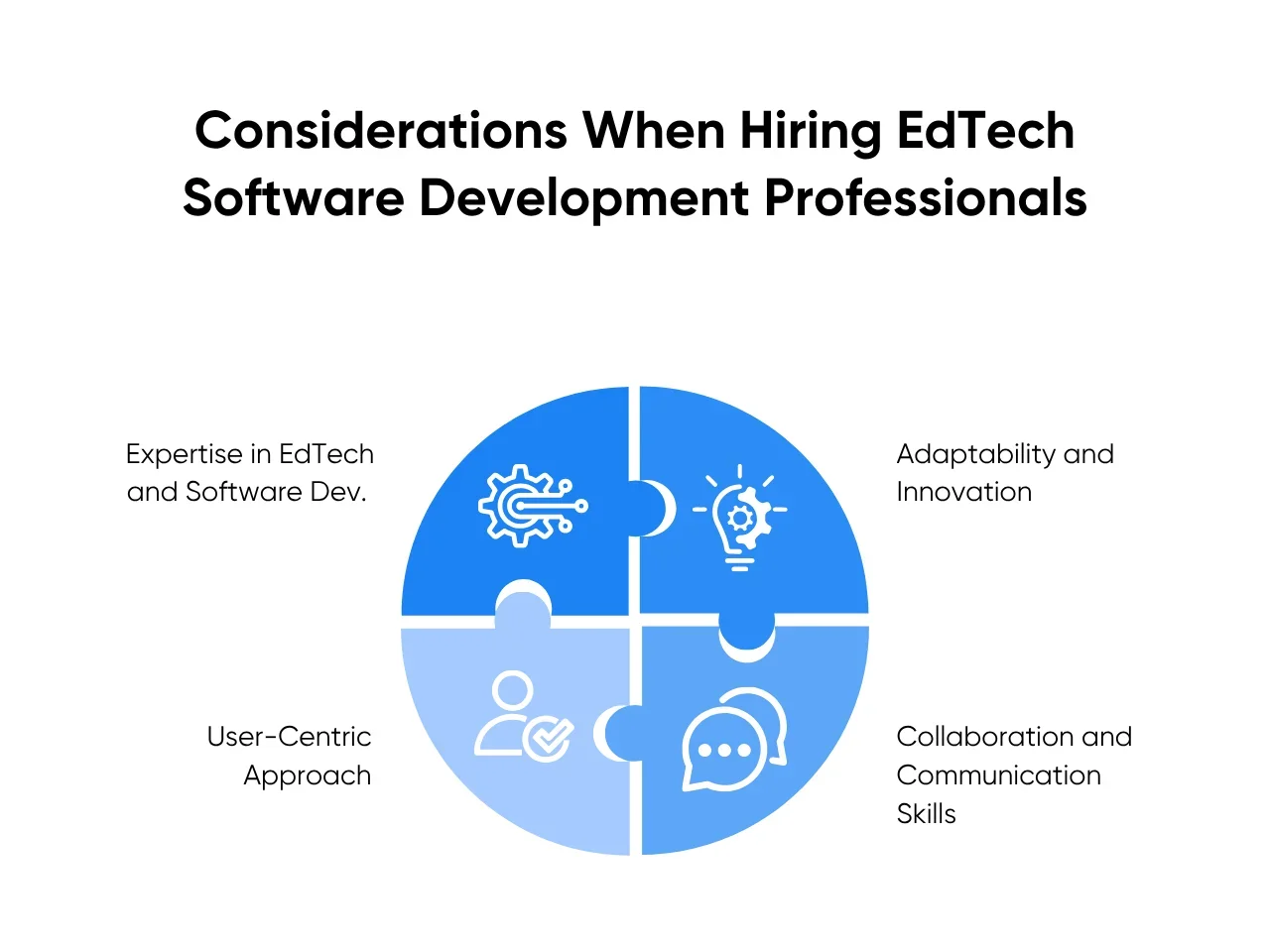
Expertise in EdTech and Software Development
When looking for professionals in EdTech software development, it is essential to prioritize candidates who possess a profound understanding of both education and technology. It is advisable to seek individuals who excel in software development while grasping the intricacies of the education sector. This combination of expertise empowers them to create solutions that align with pedagogical principles and harness cutting-edge technologies.
Adaptability and Innovation
EdTech is a swiftly changing field. Professionals in EdTech software development must exhibit adaptability to stay abreast of the latest advancements. Candidates' experience with evolving technologies and learning paradigms in previous roles is worth exploring. The ability to innovate while navigating educational requirements and technological possibilities distinguishes successful EdTech development.
Collaboration and Communication Skills
Seamless collaboration is essential in creating EdTech solutions. This requires cross-functional teams of developers, educators, designers, and other professionals. Effective communication skills play a crucial role in translating complex technical terms into easily understandable language for non-technical stakeholders. Evaluate candidates for their technical prowess and their ability to work in a team-oriented, communicative environment.
User-Centric Approach
The ultimate objective of EdTech software revolves around enhancing the learning experience. To achieve this goal, it is crucial to engage professionals who prioritize a user-centric mindset and emphasize the importance of user experience and learner outcomes. These individuals should possess strong empathy for both educators and students, as this leads to the development of intuitive and impactful software solutions.
Key Takeaway
EdTech software development professionals are crucial in creating innovative and interactive learning solutions. They are responsible for crafting platforms that enable personalized learning experiences, virtual classrooms, and skill-focusing modules to meet the changing needs of modern education. These experts possess the technical expertise to design user-friendly interfaces that ensure smooth navigation for both educators and learners.
EdTech software development professionals provide startups with a distinct advantage. They have the expertise to transform innovative ideas into practical and user-friendly platforms, driving startup success. These professionals have a profound understanding of the education landscape. This expertise enables them to develop customized solutions that perfectly address the needs of both educators and learners.
To fully utilize the potential of EdTech, startups should collaborate with skilled software development professionals. Their experience plays a crucial role in shaping innovative educational platforms. Learn more about our EdTech software development services by visiting our website or contacting us at resources@aloa.co. Together, let's shape the future of education through technology.
Frequently Asked Question
1. What types of EdTech software solutions can be developed?
You can build LMS, MOOCs, VR/AR apps, and analytics tools. Other options include adaptive learning, assessment platforms, collaboration tools, and mobile apps. Each solution serves unique learning goals and audiences.
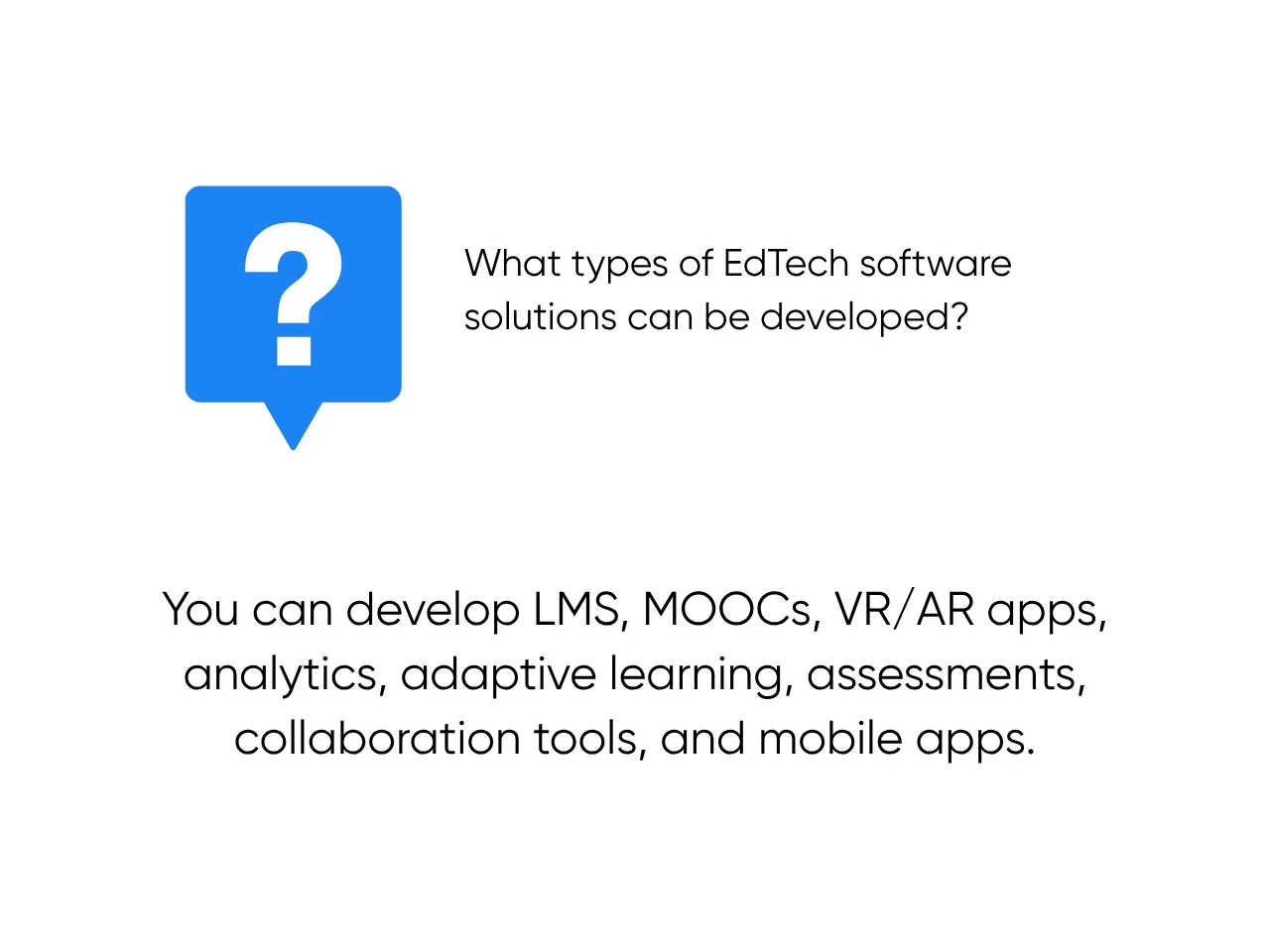
2. What compliance and regulatory standards should EdTech software meet (e.g., FERPA, COPPA, GDPR, WCAG)?
EdTech software must adhere to strict regulations to safeguard user data and ensure accessibility. These include FERPA (which safeguards student education records), COPPA (which protects children's online privacy), GDPR (which governs data protection in the EU), and WCAG (which ensures digital tools are accessible to people with disabilities, verified by a WCAG auditor). At Aloa, we walk you through each of these requirements and build every project with compliance in mind from day one.
3. How much does it cost to build an EdTech software application?
Most EdTech platforms nowadays fall somewhere between $50K and $200K, depending on features and integrations involved. At Aloa we offer a-la-carte consultations and a structured discovery phase to help you scope accurately before you commit.
4. How long does it take to develop and launch a custom EdTech solution?
Most EdTech projects take 3 to 9 months depending on complexity, from initial discovery to testing and launch. However, starting with a proof of concept (POC) using an AI-first approach can dramatically shorten the timeline. This is a smart option for founders who want to validate ideas quickly, reduce upfront risk, and start gathering user feedback earlier in the process.
5. What is the typical process for starting an EdTech project?
We kick things off with a consultative deep dive into your business goals, challenges, and user needs. From there, we build a proof of concept to test the idea quickly and ensure alignment. Once validated, we proceed to full-scale development, delivering a tailored solution that integrates seamlessly with your systems, backed by ongoing support every step of the way.
6. What are the most in-demand skills or roles in EdTech software engineering?
Full-stack developers, UX/UI designers, and data engineers are essential. AI experts and compliance specialists are also in high demand. These skills build secure, user-friendly, and innovative EdTech products. Aloa can connect you with top talent in these roles.
